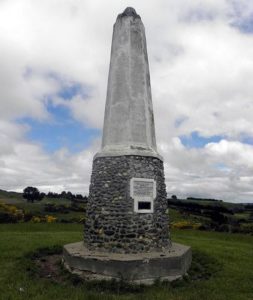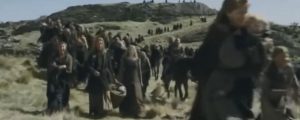1836: Battle of Tuturau
December 4, 2019
By AHNZ
 The history of Maori New Zealand is the history of North Islanders invading the South Island. According to legend, Moriori were invaded and exterminated by the Waitaha. The same was done to them later by the Ngati-Mamoe who, in turn, got theirs at the hands of Ngai Tahu. Had Anglo-Saxon colonists not interrupted this trend it was well on the way to continuing as Ngati Toa had already conquered the Ngai Tahu capital of Kaiapohia (Kaiapoi) and occupied the upper South Island.
The history of Maori New Zealand is the history of North Islanders invading the South Island. According to legend, Moriori were invaded and exterminated by the Waitaha. The same was done to them later by the Ngati-Mamoe who, in turn, got theirs at the hands of Ngai Tahu. Had Anglo-Saxon colonists not interrupted this trend it was well on the way to continuing as Ngati Toa had already conquered the Ngai Tahu capital of Kaiapohia (Kaiapoi) and occupied the upper South Island.
Today in New Zealand history, 4 December, 1836, the final of these invasions was curtailed with the Battle of Tuturau. It started with an epic Odyssey and ended in massacre.
Skinning The Ngāi Tahu Eel From Tail To Head
 Te Puoho and many of his Taranaki tribesman exited their homeland at the same time as their Ngati Toa allies led by Te Rauparaha: 1822. Their judgement was good- things were getting way too hot in that region as was proven by the Waikato Maori’s genocide to come. But for the survivors of the Siege of Otaka (1832) the Taranaki would be slaughtered by the first Maori King, Te Wherowhero.
Te Puoho and many of his Taranaki tribesman exited their homeland at the same time as their Ngati Toa allies led by Te Rauparaha: 1822. Their judgement was good- things were getting way too hot in that region as was proven by the Waikato Maori’s genocide to come. But for the survivors of the Siege of Otaka (1832) the Taranaki would be slaughtered by the first Maori King, Te Wherowhero. By the early 1830s the move had worked out pretty well for Rauparaha and his vassal chief Te Puoho. Together they had the stronghold of Kapiti Island, had conquered and settled the upper South Island, and West Coast. However, the successful allies concentrated around the Kapiti Capital grew uneasy with each other in victory and longed for breathing room. Some of the Taranaki migrants had already struck out, in 1835, to invade the Chatham Islands and make them a new territorial homeland. Te Pouho hatched a similar ambition in 1836.
By the early 1830s the move had worked out pretty well for Rauparaha and his vassal chief Te Puoho. Together they had the stronghold of Kapiti Island, had conquered and settled the upper South Island, and West Coast. However, the successful allies concentrated around the Kapiti Capital grew uneasy with each other in victory and longed for breathing room. Some of the Taranaki migrants had already struck out, in 1835, to invade the Chatham Islands and make them a new territorial homeland. Te Pouho hatched a similar ambition in 1836.
“Despite Te Rauparaha’s opposition, Te Pūoho set off with a taua (war party) to the far south in the hope of skinning the Ngāi Tahu ‘eel from tail to head’.”- Tuturau Maori reserve and war memorial; nzhistory.govt.nz
Massacre at Tuturau
 For weeks, there were no Ngai Tahu to oppose the invaders as they pushed further and further south. This was a disaster for an expedition that relied upon discovering settlements to loot in order to survive. The odyssey of Te Puoho and his c100-strong invasion force became a trial of starvation and fatigue.
For weeks, there were no Ngai Tahu to oppose the invaders as they pushed further and further south. This was a disaster for an expedition that relied upon discovering settlements to loot in order to survive. The odyssey of Te Puoho and his c100-strong invasion force became a trial of starvation and fatigue.
“..this ill-advised expedition, which must have caused a great deal of suffering, hardship, and starvation to its members for no result whatever. It really was a very wonderful undertaking considering the terrible country the taua had to pass through, and has not been equalled by any other in Maori history.” – History and Traditions of the Maoris of the West Coast North Island of New Zealand Prior to 1840; S. Percy Smith (1910); NZETC
 This illustrates two points. Maoris were not innately gifted with John Rambo and Bear Grylls special forces abilities to live off the land and find food anywhere. In fact, they were starving and according to Smith were so reduced that, “when they sat down to rest, with light loads on their backs, they had difficulty in getting up again.” The first fight was not with the Ngai Tahu but with the wilderness. Secondly, Te Pouho and his allies had done too well in smashing Ngai Tahu’s heart at Kaiapohia. Ngai Tahu’s Camelot had crumbled in the half-decade since, the people sparse and sickly¹. There was no infrastructure to loot and no defence force to overcome. Most of the South Island was a no man’s land and would remain so until the Canterbury Colonists purchased the wasteland and re-inhabited it after 1850.²
This illustrates two points. Maoris were not innately gifted with John Rambo and Bear Grylls special forces abilities to live off the land and find food anywhere. In fact, they were starving and according to Smith were so reduced that, “when they sat down to rest, with light loads on their backs, they had difficulty in getting up again.” The first fight was not with the Ngai Tahu but with the wilderness. Secondly, Te Pouho and his allies had done too well in smashing Ngai Tahu’s heart at Kaiapohia. Ngai Tahu’s Camelot had crumbled in the half-decade since, the people sparse and sickly¹. There was no infrastructure to loot and no defence force to overcome. Most of the South Island was a no man’s land and would remain so until the Canterbury Colonists purchased the wasteland and re-inhabited it after 1850.²Te Puoho and his homonymous war party picked on what few peasants and stray fishermen they found enough to eke out a living, taking the moderate village of Tuturau on the first day of Sumner. Three days later, on December 4th, Te Puoho emerged from the bed of his travelling harem to be instantly shot from the roof of the best hut he had taken for his own. ‘Bloody Jack’ Tuhawaiki, King of the Ngai Tahu, had led a defence force from Rakiura that swiftly battled and overcame Te Puoho’s threadbare forces³. The scene became a massacre and the end to all future invasions from the North.
2 thoughts on "1836: Battle of Tuturau"
Leave a Reply
 Like Comment Share
Like Comment Share






Also of interest at Tuturau is my mate who’s built a house there out of an old barn.
Down on the river, not really Tuturau per se, but the area on the river the locals call Tuturau, there’s a bend in the river and the road hugs the cliff.
Locals called it Sam’s grief. Allegedly a guy called Sam, had shotgunned some Gold into his claim or the purposes of selling it as an active gold bearing claim. Apparently they put Him a barrel and over the side He went..
There’s also a big black trout lives there,my other mate had it hooked as it sat there eating nymphs from the small creek that runs into there,but It was too smart, rubbed that hook out of it’s mouth before we could land it..
Folks didn’t take well to people salting the claims. Or even those who appeared to.
I’m keen for a visit down there. Just that’s never on the way to anywhere I’m going…